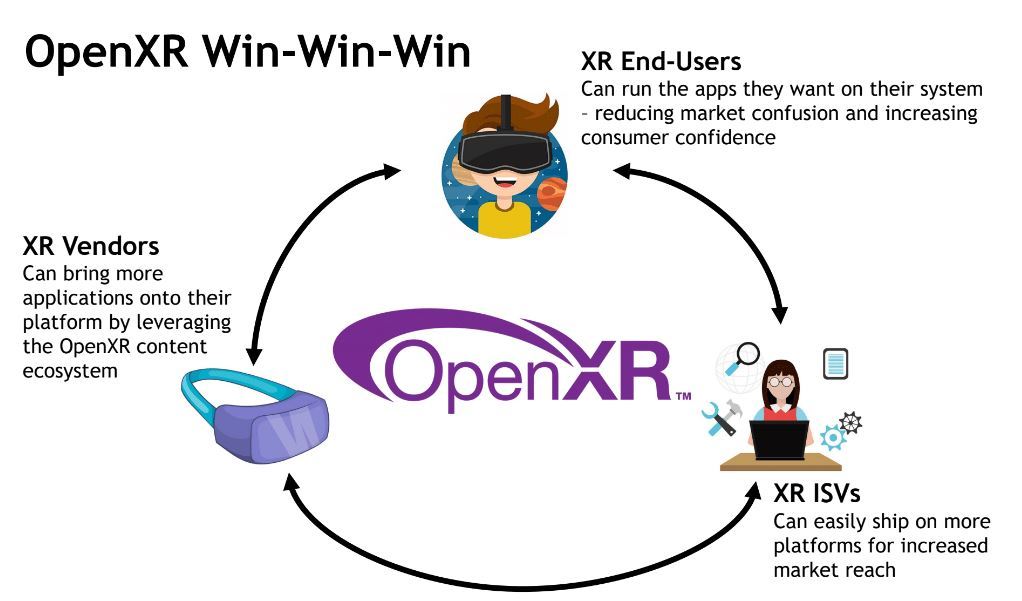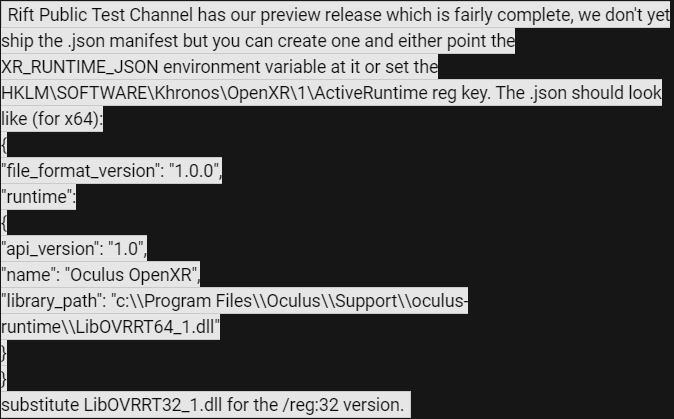Virtual Reality Standardization: Oculus Begins OpenXR Integration
Facebook has already incorporated OpenXR support for its Oculus Rift and Oculus Rift S virtual reality headsets. OpenXR refers to the open standard API for virtual reality and augmented reality technologies. The OpenXR standard was developed by the working group of the non-profit industry consortium Khronos which brings together some of the biggest players in the XR industry. Some of the members of the working group include Google, Facebook, NVIDIA, AMD, Microsoft and Valve among others.
The OpenXR API will allow developers to create codes that will be capable of running on virtually any virtual reality headset. In the pre-OpenXR environment, developers have had to write separate codes for each of the disparate virtual reality headsets, based on the device’s runtime platform.

Back in March when the OpenXR 1.0 standard was released, Facebook had declared its intention to support the standard on its Quest and Rift platforms “later this year”. The support has not yet been implemented on Quest and it hasn’t been released “officially” on Rift either. A user purporting to be a Facebook employee however posted a message on the open Khronos slack which provides instructions on how developers can activate “the preview release which is fairly complete”.
The message reads as follows:

The OpenXR support is at the moment available in the Public Test Channel of the Oculus Rift software and users are able to opt into this with just a single click. By adding the registry key provided in the message above, you will be able to successfully link your Oculus software to OpenXR. When a user launches the OpenXR test app, the Oculus app will launch successfully and recognize this as a virtual reality app.
It’s clear Facebook’s Oculus is already testing the open source programming integration interface OpenXR within its beta environment. The OpenXR standard will work as a general virtual reality interface across all virtual reality headsets. When the integration is complete, this will enable an Oculus Quest or Rift app to also run with other headsets/platforms such as the Valve Index or Vive Cosmos without the need for any adjustments in code. Currently, in the absence of OpenXR integration, developers are forced to optimize their apps for different platforms which entails investing in extra effort and more development time.
The final specifications for the OpenXr standard were presented by the OpenXR working group at the end of July of this year. The working groups aims to create a collaborative development for an open standard for both virtual reality and augmented reality applications in order to counteract a market fragmentation that is likely to create a difficult operating environment for both developers and end users.
Should the OpenXR standard be established as the de facto standard for VR/AR development and be made available on the Oculus platform, then, technically speaking, future owners of alternative virtual reality headsets will be able to seamlessly shop for apps on the Oculus Store. Of course it makes commercial sense for brands such as Oculus to be “territorial” to protect their tuff by providing exclusive access to its own hardware customers but from a technical standpoint, nothing should prevent other VR headset platforms from tapping into the Oculus Store should OpenXR be broadly implemented.
Big plans are already afoot for the OpenXR open source standard that will make even major platforms such as Oculus Home hardware-agnostic, just like the Viveport platform. Khronos Group is talking of an optional device plugin interface getting support after the OpenXR version 1.0. But Facebook is unlikely to see any economic imperative in opening up its software to other device manufacturers. With competition heating up, XR companies that already enjoy market dominance would want to maintain that advantage and work towards controlling the entire XR value chain from hardware to software to content. Oculus has in the past stated that it would open its store to competition from other hardware brands but it hasn’t commented on the issue lately which could be a sign that it is probably noncommittal on that pledge.
The news of the OpenXR implementation is also coming just a few weeks before the start of the much-awaited Oculus Connect 6 (OC6) event. During the event keynote, Facebook may unveil more details regarding its plans for OpenXR integration. This may likely come from the Oculus Chief Science Officer Michael Abrash or the CTO John Carmack.
For now, before a universal rollout of OpenXR open standards, users can rely on software such as Revive to get access to Oculus exclusives on HTC Vive via Steam. There are lots of compatible titles which are available currently.
https://virtualrealitytimes.com/2019/09/14/virtual-reality-standardization-oculus-begins-openxr-integration/https://virtualrealitytimes.com/wp-content/uploads/2019/03/OpenXR-Cross-Platform-Play-600x337.jpghttps://virtualrealitytimes.com/wp-content/uploads/2019/03/OpenXR-Cross-Platform-Play-150x90.jpgBusinessOculusFacebook has already incorporated OpenXR support for its Oculus Rift and Oculus Rift S virtual reality headsets. OpenXR refers to the open standard API for virtual reality and augmented reality technologies. The OpenXR standard was developed by the working group of the non-profit industry consortium Khronos which brings together...Sam OchanjiSam Ochanji[email protected]EditorVirtual Reality Times - Metaverse & VR
